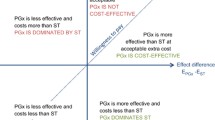Abstract
Precision medicine promises to improve both the efficacy and safety of therapeutic products by better informing why some patients respond well to a drug, and some experience adverse reactions, while others do not. Pharmacogenomics is a key component of precision medicine and can be utilized to select optimal doses for patients, more precisely identify individuals who will respond to a treatment and avoid serious drug-related toxicities. Since pharmacogenomic biomarker information can help inform drug dosing, efficacy, and safety, pharmacogenomic data are critically reviewed by FDA staff to ensure effective use of pharmacogenomic strategies in drug development and appropriate incorporation into product labels. Pharmacogenomic information may be provided in drug or biological product labeling to inform health care providers about the impact of genotype on response to a drug through description of relevant genomic markers, functional effects of genomic variants, dosing recommendations based on genotype, and other applicable genomic information. The format and content of labeling for biologic drugs will generally follow that of small molecule drugs; however, there are notable differences in pharmacogenomic information that might be considered useful for biologic drugs in comparison to small molecule drugs. Furthermore, the rapid entry of biologic drugs for treatment of rare genetic diseases and molecularly defined subsets of common diseases will likely lead to increased use of pharmacogenomic information in biologic drug labels in the near future. In this review, we outline the general principles of therapeutic product labeling and discuss the utilization of pharmacogenomic information in biologic drug labels.
Similar content being viewed by others
References
Toward precision medicine: building a knowledge network for biomedical research and a new taxonomy of disease. The National Academies Collection: Reports funded by national institutes of health. Washington (DC) 2011.
U.S. Food and Drug Administration: Paving the way for personalized medicine. Accessed from http://www.Fda.Gov/downloads/scienceresearch/specialtopics/personalizedmedicine/ucm372421.Pdf. 2013.
Walko CM, McLeod H. Pharmacogenomic progress in individualized dosing of key drugs for cancer patients. Nat Clin Pract Oncol. 2009;6(3):153–62.
Agarwal A, Ressler D, Snyder G. The current and future state of companion diagnostics. Curr Pharmgenomics Pers Med. 2015;8:99–110.
Pacanowski MA, Zineh I. Pharmacogenomic strategies in drug safety. Drug Discov Today Ther Strategy. 2012;9(2–3):e67–74.
Zineh I, Woodcock J. The clinical pharmacogeneticist: an emerging regulatory scientist at the us food and drug administration. Hum Genomics. 2010;4(4):221–5.
Food and drugs, 21 c.F.R. § 201.56 (2010).
U.S. Food and Drug Administration: Guidance for industry—clinical pharmacogenomics: premarket evaluation in early-phase clinical studies and recommendations for labeling. Accessed from http://www.Fda.Gov/downloads/drugs/guidancecomplianceregulatoryinformation/guidances/ucm337169.Pdf. 2013.
U.S. Food and Drug Administration: Guidance for industry—safety labeling changes—implementation of section 505(o)(4) of the fd&c act. Accessed from http://www.fda.gov/downloads/drugs/guidancecomplianceregulatoryinformation/guidances/ucm250783.pdf. 2013.
Zineh I, Pacanowski MA. Pharmacogenomics in the assessment of therapeutic risks versus benefits: inside the United States Food and Drug Administration. Pharmacotherapy. 2011;31(8):729–35.
Pacanowski MA, Leptak C, Zineh I. Next-generation medicines: past regulatory experience and considerations for the future. Clin Pharmacol Ther. 2014;95(3):247–9.
U.S. Food and Drug Administration: Draft guidance for industry—enrichment strategies for clinical trials to support approval of human drugs and biological products. Accessed from http://www.Fda.Gov/downloads/drugs/guidancecomplianceregulatoryinformation/guidances/ucm332181.Pdf. 2012.
Keizer RJ, Huitema AD, Schellens JH, Beijnen JH. Clinical pharmacokinetics of therapeutic monoclonal antibodies. Clin Pharmacokinet. 2010;49(8):493–507.
Shi S. Biologics: an update and challenge of their pharmacokinetics. Curr Drug Metab. 2014;15(3):271–90.
Pandey GS, Sauna ZE. Pharmacogenetics and the immunogenicity of protein therapeutics. J Interferon Cytokine Res. 2014;34(12):931–7.
Grimstein C, Bai JP. Individualizing therapy of monoclonal antibodies and fusion proteins: emerging potential in the age of personalized medicine. Ther Deliv. 2011;2(3):369–81.
Simhadri VL, Banerjee AS, Simon J, Kimchi-Sarfaty C, Sauna ZE. Personalized approaches to the treatment of hemophilia A and B. Perinat Med. 2015;12(4):403–15.
Carter P. Improving the efficacy of antibody-based cancer therapies. Nat Rev Cancer. 2001;1(2):118–29.
Mellor JD, Brown MP, Irving HR, Zalcberg JR, Dobrovic A. A critical review of the role of fc gamma receptor polymorphisms in the response to monoclonal antibodies in cancer. J Hematol Oncol. 2013;6:1.
Louis E, El Ghoul Z, Vermeire S, Dall’Ozzo S, Rutgeerts P, Paintaud G, et al. Association between polymorphism in IGG FC receptor IIIA coding gene and biological response to infliximab in Crohn’s disease. Aliment Pharmacol Ther. 2004;19(5):511–9.
U.S. Food and Drug Administration: Annual novel new drugs summary. Accessed from http://www.Fda.Gov/downloads/drugs/developmentapprovalprocess/druginnovation/ucm430299.Pdf. 2014.
Maher PD, Haffner M. Orphan drug designation and pharmacogenomics: options and opportunities. BioDrugs. 2006;20(2):71–9.
Sasinowski FJ, Panico EB, Valentine JE. Quantum of effectiveness evidence in FDA’s approval of orphan drugs: update, July 2010 to June 2014. Ther Innov Regul Sci. 2015;49:680–97.
Author information
Authors and Affiliations
Corresponding author
Ethics declarations
Conflict of Interest
This article reflects the views of the authors and should not be construed to represent FDA’s views or policies.
Additional information
Guest Editors: Shraddha Thakkar and Nisha Nanaware-Kharade
Rights and permissions
About this article
Cite this article
Schuck, R.N., Grillo, J.A. Pharmacogenomic Biomarkers: an FDA Perspective on Utilization in Biological Product Labeling. AAPS J 18, 573–577 (2016). https://doi.org/10.1208/s12248-016-9891-4
Received:
Accepted:
Published:
Issue Date:
DOI: https://doi.org/10.1208/s12248-016-9891-4




